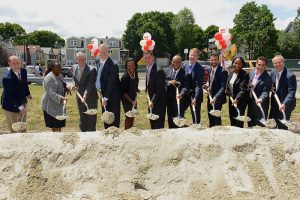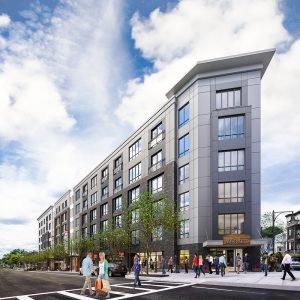Dorchester, MA Trinity Financial, a real estate development firm dedicated to revitalizing neighborhoods, strengthening commerce and fostering opportunities through a collaborative urban spirit, broke ground on Treadmark, an 83-unit mixed-income, mixed-use development in the Ashmont section of the city. The building, at 1971-1977 Dorchester Ave., is across the street from Trinity’s successful mixed-income mixed-use building The Carruth.
Treadmark, whose name reflects the history of the site of the former Ashmont Tire company, will be comprised of 51 affordable rental units and 32 ownership units all designed by HGTV star and Boston-based interior designer Taniya Nayak of Taniya Nayak Design. Treadmark will also include ground-floor retail with local businesses.
“We believe this project is a model for how to create affordable and middle-income housing,” said Trinity Financial Senior project manager Mathieu Zahler. “This public-private partnership is a national model for collaboration; the city and the state made significant investments, and our relationships with the public and private institutions we worked with were vital in making this project come to fruition. The Architectural Team, along with Taniya Nayak Design, will bring the design to life, integrating the character of Dorchester into the growing need for transit-oriented, urban development. Our goal is to accelerate Ashmont’s revitalization while maintaining a strong connection to the community whose involvement was so vitally important to getting this project underway.
The Baker-Polito administration awarded over $3 million in state and federal tax credits that will generate $22 million in equity for the project, $3 million in rental subsidy funds, and over $4 million in funding from the city of Boston. Treadmark will be an economic boost for the city, with the $45 million development project creating more than 80 construction jobs, as well as 20 additional permanent jobs to be generated from local retailers on the ground-floor.
“This development continues to build on our commitment to significantly increasing the production of workforce housing throughout the Commonwealth,” said governor Charlie Baker. “Treadmark is an impactful project for this corner of Dorchester. And it is a showcase for the power of affordable and workforce housing to transform underutilized neighborhood parcels, and build community in the process.”
“Treadmark is an example of how we’ll meet Boston’s affordable and middle-income housing needs,” said mayor Walsh. “This development shows that not only can it be done, but it can add so much value to the surrounding community.”
“This partnership with Trinity is of great importance as it underscores our long-standing commitment to community investment,” said Esther Schlorholtz, director of community investment, Boston Private Bank. “Bringing together new rental housing, retail and mixed-income for-sale condominiums with access to public transportation, the Trinity Ashmont TOD project will result in a more vital, thriving area as well as offering new housing and job opportunities. We are proud to partner with Trinity and be a key financing source for the project that will benefit this neighborhood now and for years to come.”
MHIC president Joe Flatley said, “This project is exactly the kind of project our Healthy Neighborhoods Equity Fund seeks to finance - it is transit-oriented and will create much needed mixed-income housing, neighborhood retail, and jobs. We’re pleased to work with Trinity Financial and other project partners and to participate in the on-going transformation of Boston’s Ashmont neighborhood.”
Since 1987, Trinity Financial has pursued a distinctive vision in real estate development, dedicated to revitalizing neighborhoods, strengthening commerce and fostering opportunities through a collaborative urban spirit. Their work spans half a dozen residential and commercial specialties, from multi-unit housing to transit-oriented development. Across that spectrum, Trinity projects, worth more than $950 million, demonstrate a high caliber of vision and attention to detail, which sets them apart and has led to sustainable success.
 (1).png)








